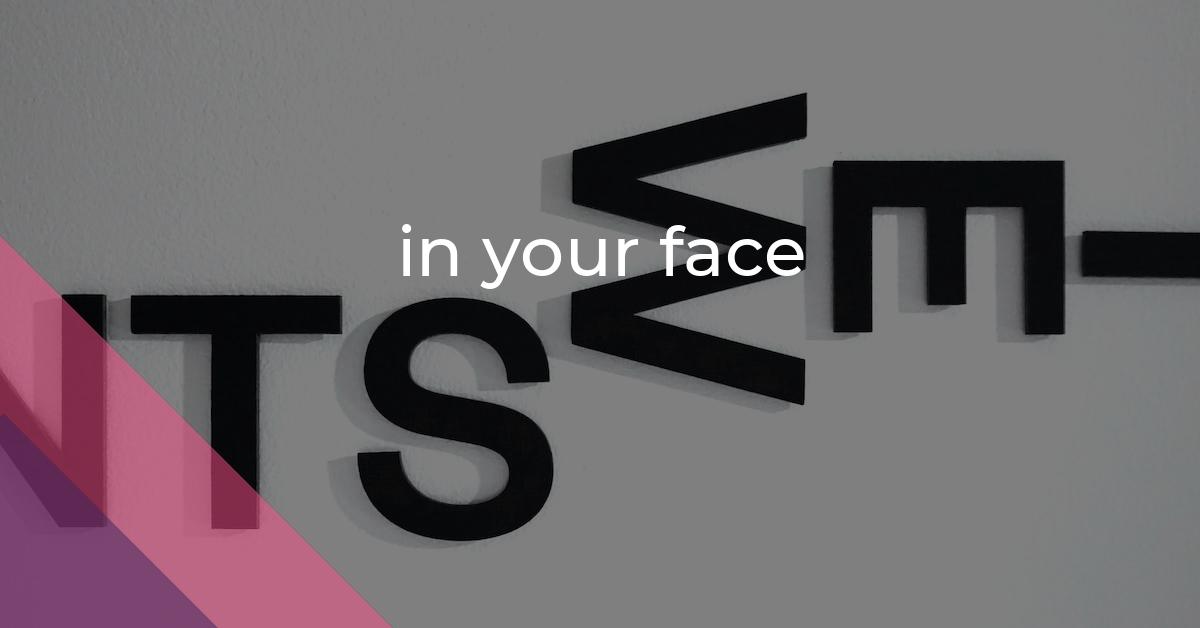in your face: Idiom Meaning and Origin
What does ‘in your face’ mean?
The idiom *in your face* means to confront someone with something aggressively or boldly, often to provoke a reaction. It implies direct and unapologetic behavior, disregarding social boundaries.

Idiom Explorer
The idiom "in the way" means obstructing or blocking the progress or movement of someone or something.
The idiom "in someone's face" means to confront or challenge someone in a direct and aggressive manner, often done to assert dominance or to express anger or frustration.
The idiom "in plain view" means something that is easily visible or noticeable, without any effort to conceal it.
The idiom "in plain sight" means something is easily visible or noticeable to everyone.
The idiom "in front of one's nose" means that something is very obvious or easy to see but is overlooked or not noticed by someone.
The idiom "in the face of" means to confront or deal with something difficult or challenging. It implies facing a problem or obstacle directly and not being intimidated or deterred by it.
The idiom "grab the bull by the horns" means to confront a difficult situation directly with courage and determination, rather than avoiding or ignoring it.
The idiom "give face" means to show respect or give someone a positive image or reputation in front of others. It is a cultural concept commonly used in East Asian societies.
The idiom "get out of my face" means to ask someone to leave or go away because they are being annoying or intrusive.
A Bold Confrontation
The idiom "in someone's face" is a related expression that builds upon the concept of "in your face." It takes the confrontational nature of the latter idiom and adds a specific target or recipient to the equation. When someone is said to be "in someone's face," it means they are being direct and confrontational towards that person specifically. This can involve challenging their opinions, beliefs, or actions in a bold and unapologetic manner. It can also refer to physically getting in someone's face to assert dominance or provoke a reaction. The use of this idiom emphasizes the intensity and personal nature of the confrontation.
in the face of challenging circumstances, the idiom "in the face of" is often employed. This expression signifies the ability to confront and deal with difficulties or obstacles head-on, without backing down or being deterred. When someone is said to face something "in the face of" adversity, it means they display courage, resilience, and determination in the face of difficult or unfavorable situations. This idiom underscores the importance of being steadfast and resolute when confronted with challenges.
When approaching a task or problem "head-on," it means taking a direct and proactive approach without hesitation or avoidance. This idiom emphasizes the need to tackle issues directly and without any detours. By confronting the situation head-on, individuals are encouraged to face challenges directly, without shying away or seeking alternative routes. It's about being upfront and assertive in one's approach, demonstrating a willingness to address the situation headfirst.
On the other hand, the idiom "face down" takes a more literal meaning. It refers to physically positioning oneself with the face or front part downward. However, in a figurative sense, it can also mean confronting or overcoming a challenge or threat through direct action or confrontation. The image of facing something down implies standing up to it with courage and determination. By facing something down, individuals assert their strength and refusal to be intimidated or overwhelmed.
Now that we have discussed related idioms, let's further explore the concept of "in your face." This idiom is a commonly used expression in American English, known for its confrontational and assertive nature. It is often used to describe a direct and aggressive approach or attitude towards someone or something. The origins of this idiom can be traced back to the early 1980s, and it gained widespread popularity in the 1990s, particularly in Hip Hop and rap music culture.
Believed to have originated in African American Vernacular English (AAVE), the idiom became a powerful expression of defiance and assertion. It provided a way for individuals to assert themselves boldly and unapologetically. Since then, "in your face" has transcended its origin and become widely used in mainstream American English.
The exact meaning of "in your face" can vary depending on the context in which it is used. However, it generally signifies a bold and unapologetic manner of asserting one's opinions, beliefs, or actions. It can also describe an aggressive or confrontational behavior aimed at provoking a reaction. In some cases, it may imply a sense of being overwhelmed or dominated by a particular situation or individual.
It is important to note that "in your face" can be used both literally and figuratively. In its literal sense, it suggests physically getting in someone's face, often in a confrontational or challenging manner. In the figurative sense, it conveys a sense of challenging or confronting someone's beliefs, ideas, or actions directly and forcefully.
Given its confrontational and assertive nature, the idiom "in your face" is primarily used in informal and colloquial contexts. It is not commonly employed in formal or professional settings. Instead, it finds greater prevalence in casual conversations, social media, and popular culture, where its direct and assertive nature is appreciated and understood.
The versatility of the idiom "in your face" lies in its ability to convey a confrontational and assertive attitude. Whether used in opposition to someone specific ("in someone's face"), in the face of challenges, or when confronting a problem head-on, this idiom encapsulates a direct and aggressive approach in various situations. It is crucial to recognize its informal nature and understand its context when encountering it in everyday conversation.
Example usage
Examples of how the idiom "in your face" can be used in a sentence:
1. After winning the game, the victorious team celebrated by shouting and dancing in their opponent's face.
2. The aggressive salesperson got right in my face, trying to convince me to buy the product.
3. When the singer hit an incredibly difficult note, the audience cheered and screamed "in your face" to acknowledge her talent.
More "Expression" idioms



